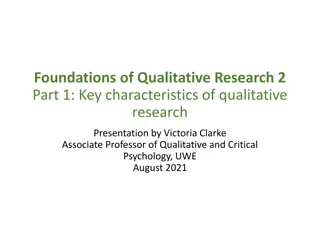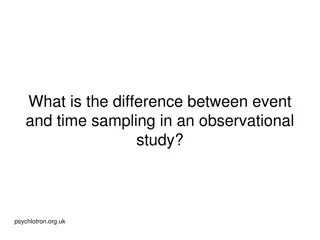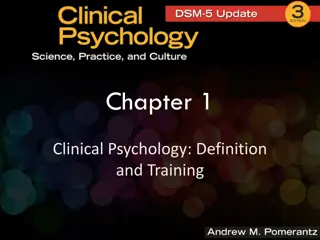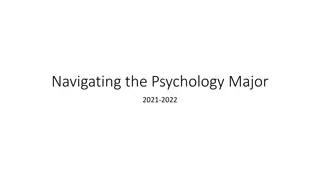Understanding Research Methods in Psychology
Explore the fundamentals of research methods in psychology, covering topics such as study design, data analysis, and theory development. Delve into the importance of good operational definitions and hypotheses, and learn about the critical assessment of theories as discussed by Meehl in 1990. Gain insights into statistical techniques, correlation analysis, and different types of research designs prevalent in psychology.
Download Presentation

Please find below an Image/Link to download the presentation.
The content on the website is provided AS IS for your information and personal use only. It may not be sold, licensed, or shared on other websites without obtaining consent from the author. Download presentation by click this link. If you encounter any issues during the download, it is possible that the publisher has removed the file from their server.
E N D
Presentation Transcript
Course overview Course goals Readings Requirements Topics http://www.uni.edu/harton/ResDes23.htm Open science movement Sign-up sheets
Basic background Independent variable Dependent variable Confounds Operationalization/operational definition Cross-sectional vs. longitudinal Reliability Validity Positive vs. negative relationship Third variable problem
More background Qualitative vs. quantitative research Induction vs. deduction
Stats review Types of data: nominal, ordinal, interval, ratio Normal distribution Mean, median, mode Range, SD Skew, kurtosis Effect size Confidence interval Mediation vs. moderation
Stats review Correlation T-test (independent and paired t) Anova Manova Linear regression Logistic regression Factor analysis (exploratory/confirmatory) Chi square Structural equation modelling Hierarchical linear modelling
Theory What do theories do for us? How can they be bad/not useful? What makes a good theory? What makes a good hypothesis? Merton s scientific norms: Universal Communal Disinterested Skeptical How is psychology doing on these?
Good operational defs and hypos What do you have to have to have a testable hypothesis? Write three possible operational definitions of mania Write a testable hypothesis related to group size
Meehl, 1990 What is the main point of the Meehl article? What is a weak theory, and why is one a problem? What happens to a theory with no support, according to Meehl? Do what areas does he apply his critiques? Are other areas of psychology doing better? Are other methods doing better?
Meehls 10 factors loose derivation chain (Kenzie) problematic auxiliary theories (Monty) problematic ceteris paribus clause (Christiana) experimenter error (Daria) inadequate statistical power (Megan) crud factor (Kate) pilot studies (Kalsang) selective bias in submitting reports (Alexa) selective editorial bias (Taylor) detached validation claim for psychometric instruments
Meehl, 1990 What are the implications of his points for the field? Are these issues more of a problem in psychology than in other fields? Are we just doing a bunch of nothing (p. 230)? What are some ways we can address these issues? Are there some things we just don t have the tools to study?
Debrouwere & Rosseel, 2021 What is the main point of this article? How are the recommendations and critiques here similar or different to those of Meehl? What do they suggest we do? Do you agree with their points?
HARKing (Kerr, 1998) What is HARKing? What is the alternative? How can you tell when people are HARKing? How often do you think it occurs? Have you ever seen or done it?
Why does HARKing happen? What are the costs of HARKing? How can we decrease it?
The Renaissance Replication crisis and aftermath 1960-2010: Meehl, Rosenthal, Cohen, Kerr, and others shouting into the wind 2011: Bem article 2012: Stapel fraud 2011 p-hacking (Simmons et al., 2011) 2012 Doyen et al. failure to replicate Bargh et al., 1996 2011-2012 Nosek developed OSF 2013 Center for Open Science
Nelson, Simmons, & Simonsohn, 2018 What do they mean when they say that this is not a file drawer problem, but p-hacking one? What are some ways p-hacking occurs? Why does it happen? How do you know if something replicates? What does a failure to replicate mean?
How can p-hacking be reduced? How can you find errors in single studies? How can you find errors in groups of studies? What doesn t work and why?
Tools Funnel plots p-curves GRIM http://statcheck.io/ Post materials Badges (open data, open materials, preregistration) Audits Meta-analyses p-value bashing
From Simonsohn, Nelson, & Simmons, 2016
How are you feeling about psychological research?
Ways to fix things Preregister (NSS, Lindsay, Simons, & Lilienfeld, 2016, Vazire, 2018) Be more precise in specifying theories (effect size predictions) (Meehl, 1990, LeBel & Peters, 2011; Fried, 2020) Make null hypotheses really alternatives (LB&P) Use more than just NHST (LB&P) Make hypotheses falsifiable (M, LB&P) Test multiple hypotheses (M, K) Use stronger methods so that failures to support can t be put off on methods (LB&P)
Do more to check R/V in studies (invariance across conditions, measures of comprehension, noncompliance) (M, LB&P) Report pilot studies (M, LB&P) Require replication (M, K, LB&P, NSS, V especially direct) Report everything (BvW, NSS, V) Share data and materials (NSS, V)
Set power at .90 or higher/ increase sample sizes (M, BvW) Report power and power analyses in articles (M) Report confidence intervals, means, and variance (M) Report overlap stats (M) Report negative results (M) Look at multiple measures and see whether you get the same effects across them (M, BvW, D&R)
Educate students on HARKing and negative practices (K) Address in codes of ethics (K, NSS) Reject HARKing articles (K) Make exploratory/post-hoc research okay (K, BvW) Use and value nonexperimental approaches (D&R)
Learn more math (M, F) Change the system (pubs=everything) (M, K) Reviewers should be more critical of lit (M, K) Realize that not everything can be tested (M) Train theoretical psychologists (F) Do interdisciplinary research (F)
Writing What is a reference manager and why should you use one? Zotero Endnote
Notes on articles What should be on your notes? How do you take notes?
Coming up with good ideas (Gray & Wegner, 2013) Get ideas from life Choose ideas that are counterintuitive to the lay person Think about feasibility issues Use involving studies Use simple stats (think about power and ability to interpret)
Next week Thought papers due by noon Tuesday (address all readings; 3-4 good points) Ethics for researchers and participants (background article; 2 chapters, one website Belmont Report, 2 articles) Proposal topics due. Paragraph on what you plan to do. Sign up for methods presentations and proposal presentations























